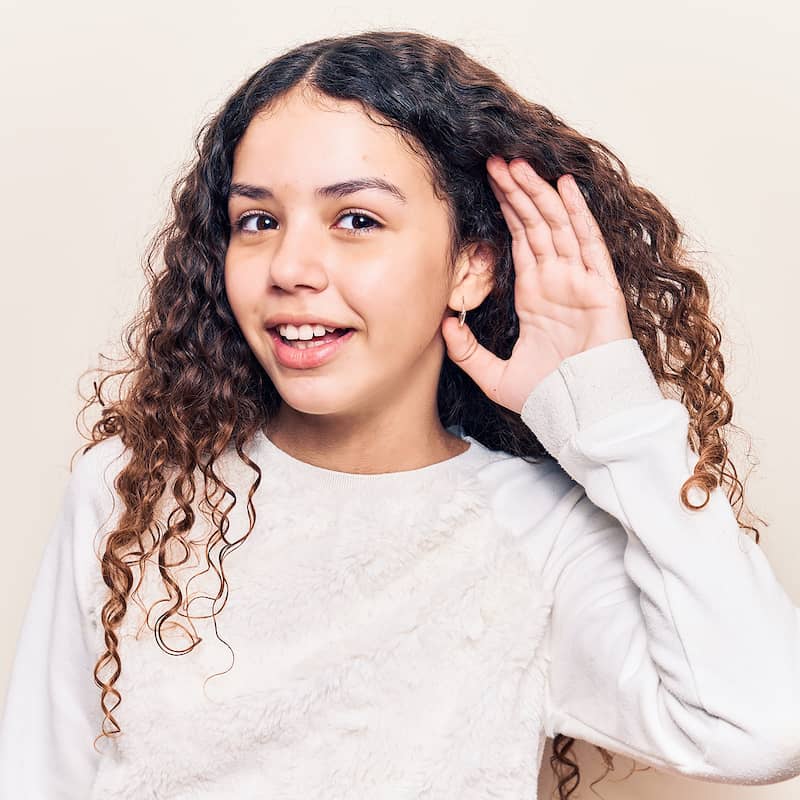Pediatric Hearing Loss
Babies are given an otoacoustic emissions test soon after birth. This is a kind of hearing test that can determine whether the cochlea (in the inner ear) is functioning normally without verbal feedback from the patient. It allows medical professionals to determine if there is a problem with a newborn’s hearing ability very early in life. If a problem is identified, doctors can then help determine whether treatment or adaptation is the best course of action.
Rest assured, the earlier any problem is discovered, the better. There are numerous resources available to deaf children and their parents, and the sooner deafness is discovered the sooner those resources can become available. Early discovery ensures that a child’s brain can develop normally, using other sense stimuli to communicate and understand the world.
If a newborn is found to have hearing loss, but some or even near normal ability to hear, addressing the issue early in life is equally important as if they could not hear at all. Treating hearing loss early allows a child to develop speech and language skills that might otherwise be difficult to attain later in childhood. The earliest years of a child’s life will deeply affect how their brain develops, even before they might enter pre-school.
How Is Childhood Hearing Loss Defined?
Hearing loss is different for everyone, no matter what age. While age-related hearing loss tends to affect high frequencies first, hearing loss from birth can take any number of forms. A child may be able to hear high frequencies but not low ones, or low frequencies but not high. They may have “flat” hearing loss, which is an equal amount of hearing loss across all frequencies.
A child is said to have hearing loss if their hearing ability is roughly 15–20 dB below what is considered normal. While “mild” hearing loss for adults is described as 25 dB below normal, even “slight” hearing loss can have a significant impact on a child’s development. Children are learning language for the first time, experiencing the world of sound in all its complexity, and developing their brains to understand as much as possible.
Even slight hearing loss can have an effect on the way a child understands speech and consequently speaks it. Moderate hearing loss could mean that a child is unable to understand speech, but they may still be able to hear many other sounds, even from very far away. If this hearing loss has been present from birth, the child will not recognize that anything is “wrong.” What may have once been called a “learning disability” could be the result of slight hearing loss.
Is Childhood Hearing Loss Common?
How Can I Tell Whether My Child Has Hearing Loss?
Birth to Four Months
- Loud sounds seem to bother them
- They wake up or move at loud noises
- Respond to your voice, smiling or cooing
- Familiar voices calm them down
Four to Nine Months
- Smile at hearing your voice
- Recognize when a toy makes sound
- Turn toward sounds they would recognize
- Babble
- Understand hand motions, like “goodbye” waves
Nine to Fifteen Months
- Babble frequently
- Repeat certain sounds
- Get your attention by voice
- Respond to their name
Fifteen to Twenty-Four Months
- Use simple words frequently
- Point to parts of their body when you ask them to
- Name objects they see frequently
- Display interest in songs and stories
- Point to objects when you name them
How Is Childhood Hearing Loss Treated?
Treatment of hearing loss in people of all ages depends on the cause. If your child has hearing loss, any of the following treatments may be recommended depending on the type and severity of hearing loss:
- Hearing aids
- Cochlear Implants
- Speech therapy
- Assistive listening devices
- Bone-anchored hearing systems
If you’re concerned that your child may have hearing loss, your family doctor can identify that there is an issue. Ashland Audiology is available and expertly qualified to assist with childhood speech-hearing-language issues.

Ashland
1901 Beaser Ave.
Ashland, WI 54806
Phone: (715) 682-9311
Fax: (715) 682-9313
Office Hours:
Monday - Thursday: 8:00 am – 5:00 pm
Friday, 8:00 am - 4:00 pm
Hearing Aid Clean & Check Hours:
Monday - Friday:
8:30 am – 3:30 pm
*Please note that the office will be closed from 12-1 pm daily for lunch. A secure drop box is available to drop off hearing aids during this time.
Hayward
Hayward Area Memorial Hospital - Specialty Clinic
11040 N. State Road 77
Hayward, WI 54843
Located in the Medical Outreach Clinic in the Heritage Building
Phone: (715) 682-9311
Fax: (715) 682-9313
OFFICE HOURS:
Every Tuesday 9:00 am - 3:30 pm
Hearing Aid Clean & Check Hours:
Call our Ashland Office to schedule an appointment to have your hearing aids cleaned.
Ironwood
Aspirus Ironwood Clinic
N10565 Grand View Lane
Ironwood, MI 49938-9622
Located on the 2nd floor of the Aspirus Ironwood Clinic
Phone: (715) 682-9311
Fax: (715) 682-9313
OFFICE HOURS:
Every other Wednesday 9:00 am- 3:30 pm
Hearing Aid Clean & Check Hours:
Call our Ashland Office to schedule an appointment to have your hearing aids cleaned.
